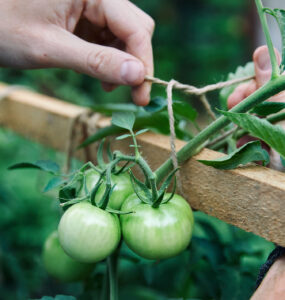
Cabbage Worm
by Rob Sproule
The Cabbage worms are out early this year! If you love to munch on broccoli, cabbage, cauliflower and the crisp, broad leaves of kale, you’re not alone. While we wait patiently for our leafy crops to mature, there’s a hungry worm waiting, too. Cabbage worm (Pieris rapae), alias cabbage white worm, alias imported cabbage worm, was introduced to Quebec in the late 19th century. It quickly spread across Canada and today afflicts Brassicas from coast to coast.
Identification
Cabbage worms are pudgy green eating machines. They’re about 2.5 cm long, velvety green and covered in tiny hairs.
You’ll probably see the worms’ handiwork before you find the worms. Look for large, irregular holes across your leafy greens. Cabbage worms are voracious, and two or three worms per plant can make it look like there’s an invading army.
The adult moths are a distinctive light grey with two darker grey spots on each wing. You’ll see them flittering about the garden at different times of the year; they can have four complete life cycles in one growing season.
Life Cycle
They’ll start out slow in spring, foraging for what they can get, but as your crops get bigger in summer, so will the worm population.
Damage
Besides causing unsightly holes in cabbage leaves, the worms can eventually kill the plants by chewing away their ability to photosynthesize. Leaves with a few holes in them are perfectly edible, however, and in some European restaurants are even sought after as evidence of a truly organic salad.
Control
The good news is that cabbage worms are delicious””if you’re a predator””and a host of spiders, wasps and beetles feast on them. Unfortunately, the worms’ speed of reproduction usually makes other control measures necessary. However, if you rely on frequent chemical use to solve other issues in the yard, you may find that the worm population builds up exponentially because many predators have been wiped out.
If the marauding moths can’t land on your veggies to lay eggs, the hatching larvae can’t eat everything. Placing floating row covers when you plant is an excellent physical deterrent. Dropping large (5 cm) pieces of egg shell around the affected area, in theory, will resemble the moths and act as a scarecrow for other moths looking to lay eggs, acting as a different type of physical deterrent.
The size of the worms, and the fact that there typically aren’t more than a few per plant, makes them easy to pick off manually (unless you have a yard full of kale). Follow the holes and green droppings; they’re typically on the leafy undersides or near the centre. It may be tricky to pick them off Brassicas that form heads, like cabbages, as they often burrow into the forming centre to munch on tender leaves.
If you like chasing butterflies, or have kids who do, you can always grab a net and chase the moths around the yard. It sounds taxing, but every moth removed is about 200 eggs taken out of circulation, not to mention the generation after that.
If preventative measures fail, there are organic options that don’t require spraying chemicals on your future salad. BTK (Bacillus thuringiensis var. kurstaki) is a naturally occurring bacteria that loves killing worms and caterpillars. It has no known toxic effect on humans, birds, pets, bees or other beneficial insects. Hot sun will kill the bacteria after a few days, so you’ll need to reapply after heat waves.















